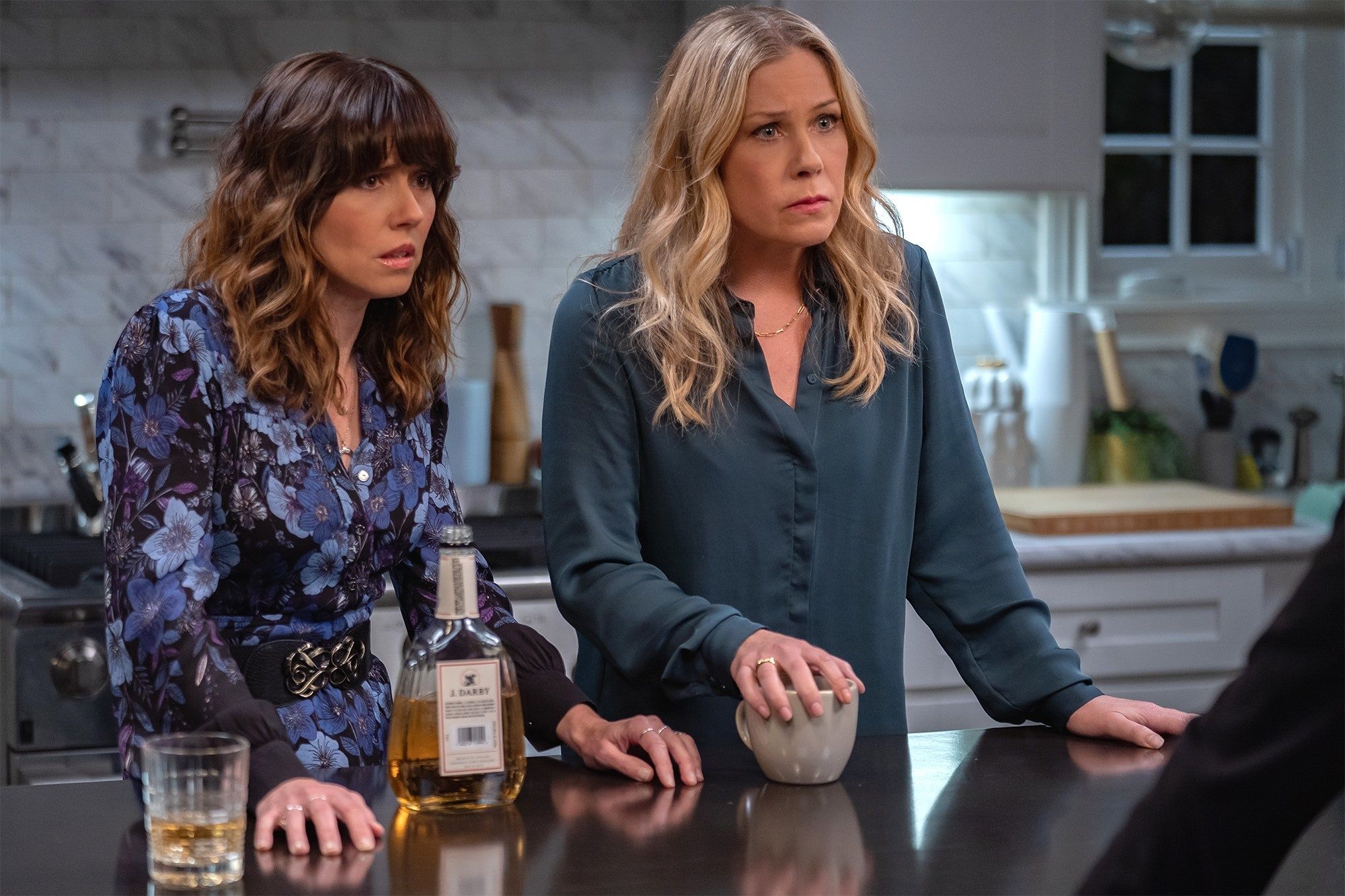"Dead to Me": A Teary, Addictive Celebration of Self-Loathing and Female Friendship
In "Dead to Me" Season 2, two friends have each killed the others' significant other. Things only get messier from there.
Jen and Judy cry a lot during the second season Dead to Me, Netflix's dark comedy about two extremely guilt-ridden women.
These aren't single-tear kind of cries; they're full-on, messy, explosive, world-is-falling-down-around-me kind of wracking sobs.
For those who need a refresher, the first season revolved around the death of Jen's (a delightfully angry Christina Applegate) husband, killed in an accidental hit-and-run by Judy (Linda Cardellini). Overcome with guilt, Judy befriends Jen (without telling her the truth), and the two become fast friends. Ultimately, Judy confesses, and things spiral from there.
At the end of the first season, caught up in a fit of rage, Jen kills Judy's boyfriend Steve (a skeevy James Marsden) and spends the rest of the season dealing with the fallout from that crime. The show has all the hallmarks of a classic crime drama: There are burning cars, burying bodies, and a web of lies that grow more and more tangled as the plot zooms on. But what sets Dead to Me apart is not the actual events of the show. Instead, it's the depth of its central characters' inner worlds.
Judy and Jen are two very internally damaged women who deal with their trauma in contrasting ways. Jen's rage at herself gets sent outwards, in explosive, fiery bursts. She willingly alienates herself from people she loves, tampering down her true feelings until they explode in acts of wild impulsivity.
Judy's shame turns into codependency and love—it's as if Judy thinks that if she only loves the world around her enough, then she could love herself or love away her mistakes. She permits a certain level of abuse from both Jen and her ex, Steve, but her forgiving nature is also her best quality, the one that earns her as much love as it takes away.
Neither woman can figure out how to heal, so they circle around their own wounds, creating wider and wider circles of chaos the further they run from themselves. In each other, they find both vindication and healing, a form of acceptance that's both unconditional and enabling.
Because of its lightly comedic undertones and stylish, heavily moneyed California set design, Dead to Me usually refrains from ever growing truly abysmal or cerebral. Its characters are stopped by the police and set free dozens of times, a clear example of their privilege, as Applegate notes in a way that feels half-hearted. They're constantly forgiven, and they forgive and hurt each other over and over in a routine that becomes almost exhausting by the end—but that routine is in the show's DNA, a kind of macabre slapstick.
That suburban paradise might contain villainous darkness is not a new idea, but Jen and Judy's chemistry makes this timeworn plot point feel new. These characters are always capable of more evil and more love. They always circle back to their original selves, rarely changing in a way that's deeper than surface-level. They're allowed to do this by socioeconomic circumstance and by privilege, certainly, and also because the world doesn't care as much about them as they'd both like to think. Their self-loathing comes from a place of extreme self-absorption; they both fight for their vindication while obsessing over covering their own tracks.
Slowly, the characters erode each other's own bad habits. Judy wears down Jen's hard surfaces, and Jen gives Judy strength to assert her own independence; but in some ways, they remain fixed in their self-sabotage. They do learn lessons—trauma lives in the body, says Ben, a chiropractor who is somehow (unfathomably) Steve's identical twin—and they learn to release the heavy weights of their own mothers, one of whom is in prison while the other is dead.
The show is sometimes less than subtle about its feminist leanings. It's peppered with teachable moments—at one point, Jen calls out a man who assaulted her during a public hearing, and at another she rips apart her son for criticizing her emotions. At Jen's worst moment, during one of her ugly sobs, she says, "I'm DeNiro in every movie." It reminds us that we're used to seeing men commit crimes and spend the rest of the film or TV show ignoring their own families and working to protect themselves. Does that vindicate Jen and Judy? Does Steve's verbal abusiveness make it okay that Jen killed him? Dead to Me smartly doesn't try to proselytize. It just meets its characters where they are at the bottom of the pits.
It's clear that the heaviest weight and the largest roadblock to change is the weight of these women's own self-loathing and their inability to confront their internal shadows. "I wish you would love yourself more," Judy says to Jen often, but never really says it to herself. They're quick to critique each other's body-shaming tendencies but quicker to drink their own away.
Their avoidance is also an act of protection. Dead to Me "reaffirms that no matter how much we think we're unworthy of love or how bad we think of ourselves, we can always heal," writes Andrea Towers for The Mary Sue. Apparently, no matter how much we sob—no matter how broken we feel we are—and even if we just buried our ex-fiance's body—we can still drink and dance afterwards.
There's something cathartic about seeing Jen and Judy break down, freak out, and love each other back to relative stability over and over again. Their relationship might not be friendship goals, per se, but it's also a glorious example of the powers of friendship even at the darkest times. The show constantly implies that no matter how broken you are, there's someone as f*cked up as you who will love you exactly as you are.
